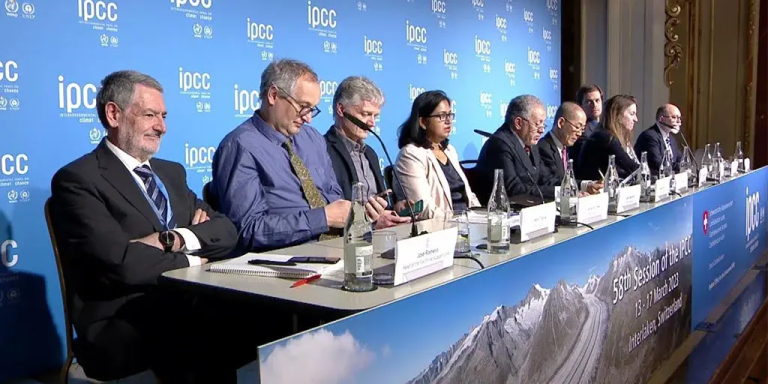From the Daily Skeptic
Chris Morrison
Concerns are growing that the Intergovernmental Panel on Climate Change (IPCC) may downplay or even abandon its current findings that nearly all types of extreme weather events had little or no evidence of human involvement in the past, or will have none by 2100 Any sign of human involvement.
The findings in the recent Sixth Assessment Report are a thorn in the side of alarmists, as attribution of “extreme” weather events has recently become a major scare tactic in promoting “net zero” fantasies. The IPCC findings were ignored, and a large pseudoscientific “attribution” industry was created within the Green Blob, feeding impossible and unverifiable “scientist-said” stories into the mainstream. At a recent “scoping” meeting in preparation for the IPCC's Seventh Assessment Report, a press release claimed that, in direct contradiction to previous work, a century of burning fossil fuels has led to “more frequent and more intense extreme weather Incidents have had increasingly dangerous consequences.”
The stance of not attributing severe weather directly to human causes brings great credit to the IPCC. It has faced legitimate criticism in the past that it is a biased institution that is highly selective in the science it emphasizes. Recent research by Clintel found that at least 42% of climate scenarios follow worst-case “pathways” where temperature increases are extremely unlikely. Its Summary for Policymakers (SPM) is a political document that must be agreed by politicians in all 195 subscribing countries. Oddly missing from the more widely distributed SPM is the IPCC assessment statement that high-temperature pathways are “very unlikely”.
Still, the IPCC, under its original terms of reference in 1998, is required to act on an “objective, open and transparent basis” when investigating human-induced climate change. It also stipulates that its reports should be “neutral with respect to policy.” All evidence suggests these instructions are often ignored.
Distinguished science writer Roger Pielke Jr. took note of comments made by new IPCC President Jim Skea at the recent COP 29 in Azerbaijan and sees clear dangers ahead , he said the meeting was entirely focused on advocacy. “I want to focus most of my remarks on the opportunities for near-term action — and indeed the benefits. But first a word about urgency. Calls to action or pleas for urgent action are not part of the Intergovernmental Panel on Climate Change,” Pielke noted. Terms of Reference of the Special Committee “There are many groups that play this role. There is only one IPCC,” he added.
Of course, it has long been observed that the original terms of reference of the IPCC were to investigate man-made Climate change inevitably leads to a biased narrative. The IPCC would never find that humans have a negligible impact on the climate because the existence of the climate would be called into question. Twenty-five years later, a global elite political movement funded by virtually unlimited subsidies has emerged to occupy the commanding heights of economic and social life. It needs the support of the IPCC, and the IPCC and thousands of funding-hungry scientists need it to survive.
Viewed in these terms, it's clear that the Intergovernmental Panel on Climate Change will be under pressure to rescind its infuriating statement that humans are not causing the weather to get worse. The release provides further clues about possible future travel directions. “With every additional bit of warming, the impacts will intensify, especially for the most vulnerable communities, which account for 3.3-3.6 billion people.” Some of the scary numbers are so precise – where do they come from? Roger Pielke noted that the statement read like “a boilerplate document from any ordinary climate advocacy group, rather than what one would expect from a leading international scientific assessment.”
At the same time, the power of attribution continues to grow. Professor Richard Bates, head of climate impacts at the Met Office and recently appointed special adviser to the Commission on Climate Change, recently said that attribution of weather can only be done after all factors have been taken into account and that “human influence is still driving the change.” “The only reasonable mechanism”. It's easy to understand from these comments alone why the IPCC refuses attribution. Using computer models to analyze multiple perspectives on a chaotic, non-linear atmosphere full of complex natural changes and concluding that humans may be responsible is not science but pseudoscience because its findings cannot be checked or falsified .
Roger Pielke was particularly unimpressed by what he called the “alchemy of weather attribution.” In his view, attribution science is a form of “tactical science.” This type of science serves legal and political purposes, and the work is “often promoted through press releases.” The IPCC itself notes that the usefulness and applicability of existing extreme weather attribution methods remains “controversial.” Unless scientists find a way to turn pseudoscientific opinions into scientific fact, one can only hope that the IPCC's current stance on the attribution industry can withstand all the debate and political pressure in the upcoming review of the assessment.
Chris Morrison is daily skepticof Environment editor.
Relevant
